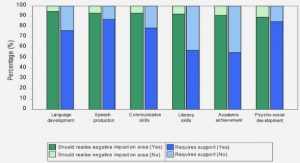Get Complete Project Material File(s) Now! »
Research Philosophy
The research method chosen for this thesis was a qualitative method. The purpose of a qualitative study is to understand and adapt dimensions of different perspectives and social worlds, meanwhile illuminate personal meanings of a study’s participants (Fossey, Harvey, Mcdermott & Davidson, 2002). The choice, made by the authors, of adopting a qualitative method was since the research was based on the understanding of different perspectives rather than statistic data.
The research philosophy the authors of this thesis have chosen was the interpretivist perspective. The research structure of an interpretivist is, according to Edirisingha (2012), defined as being personal, flexible and interpret human interactions. The one who is researching with an interpretivist perspective is open-minded throughout the researched topic and base the thesis on aspects of informants (Hudson & Ozanne, 1988). The value of understanding rather than predict and generalising is of high importance to the interpretivist researcher (Neuman, 2000; Hudson and Ozanne, 1988). The thesis aimed to interpret the information given by the informants, which support the decision of adopting an interpretivist perspective.
The choice of methods is supported by the fact that the authors of this thesis wanted to understand different perspectives received from the interviews conducted during the empirical data collection phase. After leading the interviews, the authors compared the results with the facts presented in the literature review to identify similarities and differences.
Research Approach
The research approach chosen for this thesis was an inductive approach, as the information provided by the empirical research was analysed together with relevant theories with the aim to draw objective and researched based conclusions. By having inductive reasoning, throughout the report, researchers aim to base the analysis on observational elements rather than existing theories (Williams, 2007). Inductive reasoning includes the researcher’s objective to understand and find relationships between different aspects, presented by the empirical study (Saunders,Lewis, & Thornhill, 2012). Saunders et al. (2012), continue by stating that an inductive approach is open-ended and create possibilities of exploration of the topic. Therefore, the question designed for the interviews of this thesis was primarily formulated as open-ended-questions, where the interviewees had an opportunity on elaborating on their experience rather than only proving existing assumptions. A semi-structured interview is one of the most commonly utilised techniques in a qualitative method (Kitchin & Tate, 2000. p. 213). Clifford, Cope, Gillespie and French (2016) explained that a semi-structured interview generates an open-response from the participants, unlike close-ended questions which only provide limit information.
Data Collection
The collection of the data was made by conducting a literature review and collecting primary data. The primary data was collected through the empirical study conducted by interviews, while the literature review of this thesis discusses the current literature of the chosen subject matter. For answering the research questions, the primary data conducted from the interviews were used. This method goes along with having an inductive approach as researchers, from the empirical findings, draw conclusions (Locke, 2007).
Primary Data
The primary data was collected through the empirical study, which was conducted through interviews with the selected participants. As mentioned above, the interviews were built on a semi-structured outline to receive more information than expected. In some of the interviews, additional questions were asked to obtain more accurate information regarding the research questions. During the primary data collection, the interviews were audio-recorded where the data was saved until the end to limit the possibility of misconception.
The primary data was conducted from eight semi-structured interviews with confirmed representatives from 6 different social enterprises in the renewable energy sector in Sub-Saharan Africa. After contacting the relevant participants for this thesis via email, Skype interviews were scheduled due to geographical locations. The interviews started with a brief presentation about the thesis, the research purpose and the addressed topic. The interviewees were informed that the interview would be recorded.
The authors of this thesis utilize the technique of coding, explained in the research approach, to get a more comprehensive understanding of the interviewee’s perspectives and answers. Table 1 presents the names of the companies interviewed and the duration of each interview.
The companies’ websites were used as an additional source of data to get more information about the participating companies.
Literature Review
The method utilised, when collecting data for the literature review, was of the systematic literature research approach; by identifying, analysing and integrating the findings to the chosen study. Limitations were highly valued by the authors when searching for articles to collect articles of relevance. Therefore, the filter applied when searching for items in Jönköping University’s library was limited to peer-reviewed articles.
First, the authors of this thesis searched for the areas within the topic “Social enterprises in the renewable energy sector in Sub-Saharan Africa”, to get a broader understanding of existing research. The areas which were chosen to begin the research phase was; Social enterprises and Renewable energy in Sub-Saharan Africa. There was not much to be found when including Sub-Saharan Africa as a critical word and therefore, the authors needed to broaden the perspective and research to developing countries, not specific Sub-Saharan Africa. Research about different social enterprises from different areas was conducted. However, due to the well-studied field; Renewable Energy, the authors could include the chosen sector throughout the research.
To narrow down the number of articles presented in Jönköping University’s library, the authors chose to focus on the critical factors of success and barriers to social enterprises in therenewable energy sector. This limitation generated a lack of information, and one research gap was discovered. To enhance the research, the following keywords were implemented in the continued search within the topic; social enterprises in the renewable energy sector, renewable energy in developing countries, social enterprises in developing countries and barriers and success factors of social enterprises.
One model, The Institutional Theory Model, were discussed in the literature review. The Institutional Theory Model that points out that support from formal and informal institutions are of importance in the emergence and implementation of social enterprises. The arguments of this model are supported by the primary articles used to research the success factors and barriers to social enterprises.
After evaluating the relevance of the articles utilised for this literature review, 28 of the articles used for this literature review were chosen as the basis for this thesis (see Appendix I). From the existing literature, discussed in the literature review, five themes were extracted, see table 2; Social Enterprises & Sustainability, Success Factors to Social Enterprises, Barriers to Social Enterprises, Developing Countries and Renewable Energy. Appendix II illustrates each article by number and by which theme(s) they are identified with. These themes were then utilised to develop the research questions.
1. Introduction
1.1. Background
1.2. Problem
1.3. Purpose
1.4. Delimitations
2. Literature Review
2.1. Sub-Saharan Africa
2.2. Renewable Energy
2.3. Social Entrepreneurship and Enterprises
2.4. Social Entrepreneurship and Sustainability
2.5. Success Factors and Barriers to Social Enterprises
2.6. Social Entrepreneurship through an Institutional Perspective
2.7. Summary
3. Method
3.1. Research Philosophy
3.2. Research Approach
3.3. Data Collection
4. Empirical Findings
4.1. Emerging Cooking Solutions .
4.2. VITALITE
4.3. BRIGHT
4.4. Fenix International
4.5. ZOLA Electric
4.6. WidEnergy
4.7. The Success Factors of Social Enterprises in the Renewable Energy Sector in Sub-Saharan Africa
4.8. The Barriers of Social Enterprises working in the Renewable Energy Sector in Sub-Saharan Africa
5. Analysis
5.1. Brief summary of the analysis of the empirical findings
5.2. The Success Factors of Social Enterprises in the Renewable Energy Sector in Sub-Saharan Africa
5.3. The Barriers of Social Enterprises working in the Renewable Energy Sector in Sub-Saharan Africa
5.4. Conceptual framework for future entrepreneurs establishing a social enterprise in Sub-Saharan Africa
6. Conclusion
6.1. Discussion
6.2. Suggestions for Future Studies
GET THE COMPLETE PROJECT
Social Enterprises: How to succeed in the renewable energy sector in Sub-Saharan Africa






